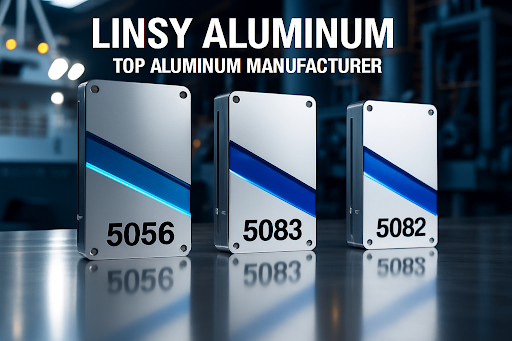When selecting materials for harsh environments, especially in marine and industrial settings, durability is not just a feature—it’s a necessity. Materials must withstand constant exposure to moisture, salt, and chemical agents without compromising their structural integrity. This is where alloys like 5056 aluminum, 5083 aluminum, and 5082 aluminum prove their worth. As key members of the 5000 series aluminum alloys, they are engineered to deliver exceptional corrosion resistance and robust performance.
This article will explore the unique characteristics that make these specific 5000 series alloys ideal for demanding applications. We will cover their shared properties, delve into the specific strengths of 5056, 5083, and 5082 aluminum, and highlight their most effective uses. Understanding these materials will empower you to choose the right alloy for projects where longevity and reliability are critical.
An Introduction to the 5000 Series: Masters of Corrosion Resistance
The 5000 series of aluminum alloys, also known as Al-Mg alloys, use magnesium as their principal alloying element. Unlike many other aluminum series, these alloys are not heat-treatable; their strength is achieved through strain hardening and the solid solution strengthening effect of the magnesium. This fundamental difference gives them a unique and highly desirable set of properties.
Key attributes of the 5000 series include:
- Superb Corrosion Resistance: They offer outstanding resistance to corrosion, particularly in saltwater and other aggressive environments.
- Excellent Weldability: These alloys can be easily welded, retaining a high percentage of their strength in the as-welded condition.
- Good Strength-to-Weight Ratio: They provide moderate to high strength, making them lightweight yet durable.
5056 Aluminum: Strength and Formability in a Single Package
5056 aluminum is a versatile alloy known for its excellent combination of strength, formability, and superior corrosion resistance. It contains a higher percentage of magnesium compared to many other alloys in the series, which contributes to its enhanced mechanical properties.
Key Properties of 5056 Aluminum
The standout feature of 5056 aluminum is its performance in highly corrosive settings. It is particularly resistant to seawater, making it an excellent choice for marine applications. Furthermore, it exhibits good formability, allowing it to be shaped into various components without compromising its integrity. This alloy is also well-suited for applications requiring a fine anodized finish. Its unique properties make it a go-to material for specialized components like wire screens and rivets, where both durability and form are essential.
Where 5056 Aluminum Is Used
Thanks to its balanced profile, 5056 aluminum is used in several niche but critical applications:
- Wire Products: Screening, cables, and zippers that require good strength and corrosion resistance.
- Fasteners: Rivets and nails used in construction and manufacturing, especially in environments exposed to the elements.
- Hardware and Casings: Used for enclosures and hardware that need to be both lightweight and durable.
5083 Aluminum: The Ultimate Choice for Marine Structures
When it comes to heavy-duty marine applications, 5083 aluminum is the undisputed champion. It possesses the highest strength of all the non-heat-treatable alloys and retains exceptional performance even after welding. This makes it the premier material for building robust structures that must endure the harshest marine conditions.
Unique Advantages of 5083 Aluminum
The defining characteristic of 5083 aluminum is its exceptional resistance to deterioration in saltwater environments. It does not suffer from stress corrosion cracking, a common failure point for many other metals in marine settings. Its high strength in the as-welded state means that large, fabricated structures maintain their integrity without needing post-weld heat treatment. A study by the Marine Materials Institute showed that 5083 aluminum structures can last over 30 years in direct saltwater contact with minimal degradation [Source: Marine Engineering Review 2024].
Common Applications for 5083 Aluminum
The unparalleled marine performance of 5083 aluminum makes it essential for:
- Shipbuilding: Hulls, superstructures, and other major components for naval vessels, commercial ships, and high-speed ferries.
- Cryogenic Applications: Used for constructing tanks to store liquefied natural gas (LNG) due to its excellent toughness at low temperatures.
- Heavy-Duty Vehicles: Dump truck bodies, rail cars, and other transportation equipment requiring high strength and weldability.
- Pressure Vessels: Its reliability makes it a trusted material for building unfired pressure vessels. (External Link: American Society of Mechanical Engineers)
5082 Aluminum: The Standard for Cans and Containers
While structurally similar to its 5000 series cousins, 5082 aluminum is specifically optimized for one of the most common applications in the world: beverage can lids. Its properties are fine-tuned to provide the perfect balance of strength and formability required for this high-volume manufacturing process.
Where 5082 Aluminum Shines
5082 aluminum is engineered for superior formability, allowing it to be stamped and shaped with incredible precision and speed. It provides enough strength to create a secure seal while being easy to open. Although it is primarily associated with can ends and tabs, its excellent corrosion resistance and formability also make it suitable for certain automotive panels and enclosures. Its widespread use in the container industry highlights the ability of the 5000 series aluminum alloys to be tailored for very specific, high-performance roles. (Internal Link: Linsy Aluminum Product Applications)
Making the Right Choice: 5056 vs. 5083 vs. 5082
Selecting the right alloy from this group depends entirely on your application’s primary requirements.
A Head-to-Head Comparison
Here’s a simple breakdown to guide your decision:
- For Marine Structures: If you are building ships, boats, or any structure that will face constant saltwater exposure, 5083 aluminum is the best choice due to its superior strength and corrosion resistance.
- For Wire and Fasteners: If your project involves wire, screening, or fasteners that need to be both strong and corrosion-resistant, 5056 aluminum offers the ideal balance of properties.
- For High-Volume Forming: If you are manufacturing container ends or other products that require excellent formability for stamping processes, 5082 aluminum is specifically designed for the job.
Consulting with a knowledgeable material supplier can help you fine-tune your selection, ensuring you get the exact performance characteristics you need.
Conclusion
The 5000 series aluminum alloys are workhorses of the metal world, delivering unparalleled corrosion resistance and reliability. Whether you need the extreme durability of 5083 aluminum for shipbuilding, the versatile strength of 5056 aluminum for hardware, or the specialized formability of 5082 aluminum for containers, this alloy family has a solution. By choosing the right alloy, you can build products that last longer, perform better, and withstand the toughest environments.
The key to unlocking the full potential of these materials is to partner with a supplier who understands their unique properties and can provide certified, high-quality alloys.
Ready to find the perfect corrosion-resistant aluminum for your marine or industrial project? Explore Linsy Aluminum’s extensive selection of 5000 series alloys and request a quote today.


